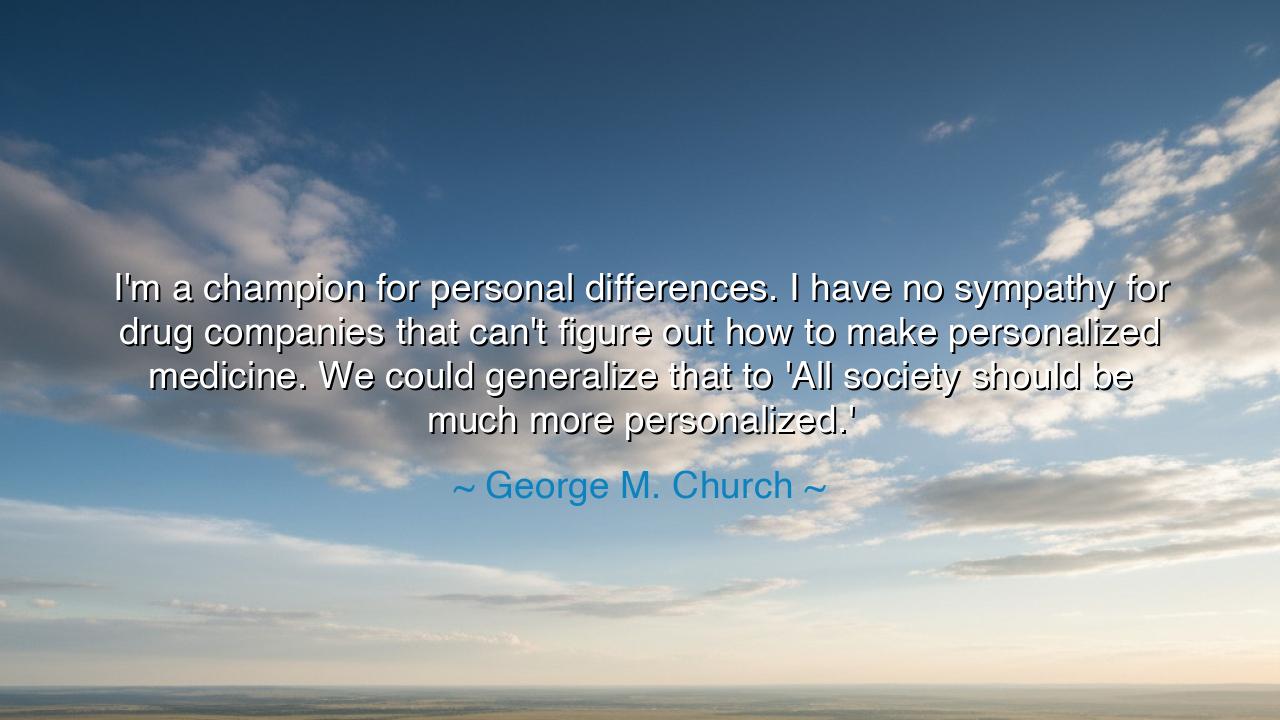
I'm a champion for personal differences. I have no sympathy for
I'm a champion for personal differences. I have no sympathy for drug companies that can't figure out how to make personalized medicine. We could generalize that to 'All society should be much more personalized.'






Listen closely, children of the future, for the wisdom of the ages is passed down in moments such as these. The words of George M. Church, a man of science and vision, echo across time, revealing profound truths about the individual and society. He said: "I'm a champion for personal differences. I have no sympathy for drug companies that can't figure out how to make personalized medicine. We could generalize that to 'All society should be much more personalized.'" In this simple declaration, Church speaks to the great need for understanding and honoring the uniqueness of each person, and the injustice of a world that often seeks to generalize and homogenize the vast diversity of human experience.
In the world of science, medicine, and society, there has always been a tension between the universal and the individual. The ancients understood this tension well. In the great works of Homer, the heroes were always individuals—Achilles, Odysseus, and others who, though they shared the bonds of kinship or comradeship, were defined by their unique qualities, their personal strengths, weaknesses, and destinies. They were not simply representations of a larger group but were people who carved their paths, who defied the general expectations of their time, and who, in their struggles, showed us the importance of personal differences. The personal journey was sacred, and the story of each individual was worth telling in its own right.
Church’s words, though born in the modern age of genetics and medicine, speak to this ancient truth: the path of personalization is the one that recognizes the infinite variety of human existence. The call for personalized medicine is a plea for a system that sees the individual—not as a member of a faceless collective, but as a unique person with a unique body, mind, and soul. In the world of pharmaceuticals, where medicines are often mass-produced to serve a generalized population, Church’s critique points out a fundamental flaw: the human being cannot be reduced to a set of common characteristics. What works for one might harm another, and in the sacred art of healing, we must honor the differences that make each person who they are.
Consider the story of Asclepius, the ancient Greek god of medicine, who was not simply a healer but one who understood the personal nature of health. His temples were not places of mass healing but of individual care, where each person’s illness was treated with great attention to their specific needs. The healers who followed him sought to understand the particulars of each patient—whether through the use of herbs, the right balance of diet, or the spiritual remedies that matched their inner struggles. They did not rely on a one-size-fits-all approach. In the same way, Church’s call for a personalized society is not simply about medicine—it is about recognizing the individual worth of each person and tailoring the world around them to fit their unique needs, abilities, and potential.
In the modern world, we find ourselves living in a time when generalization has often become the rule. Society, from education to healthcare, often fails to recognize the individual. We are boxed into categories: age, race, income, gender, and countless other labels. While these categories are not without merit, they often obscure the depth of the human experience. Church’s words call for a revolution in the way we view the world—one that celebrates the individual and recognizes that true progress can only be achieved when we build systems that honor the unique while fostering shared humanity.
This, children, is the lesson of personal differences. As you move through life, remember that no two people are alike, and therefore, no one solution can work for all. Each person has their own story, their own path, and their own needs. Whether you are creating systems, designing policies, or interacting with others, take the time to see the individual. Honor the uniqueness of each person you meet. Treat them not as a part of a collective, but as a living, breathing soul with hopes, dreams, and struggles all their own. This is not only a moral imperative but a practical one, for the world thrives when each individual is given the freedom to grow according to their own nature.
Finally, children, understand that the call for personalization is not just for medicine or society, but for life itself. We are all, in the end, bound together by the tapestry of our differences. To truly live well, to bring about justice and harmony, we must celebrate what makes each person who they are. Do not seek to make the world fit your view, but to let the world see and respect the individual nature of each soul. The future belongs not to those who try to make everyone the same, but to those who learn to see the diversity of human experience and celebrate it in all its forms. In this, true progress and peace will be found.






AAdministratorAdministrator
Welcome, honored guests. Please leave a comment, we will respond soon